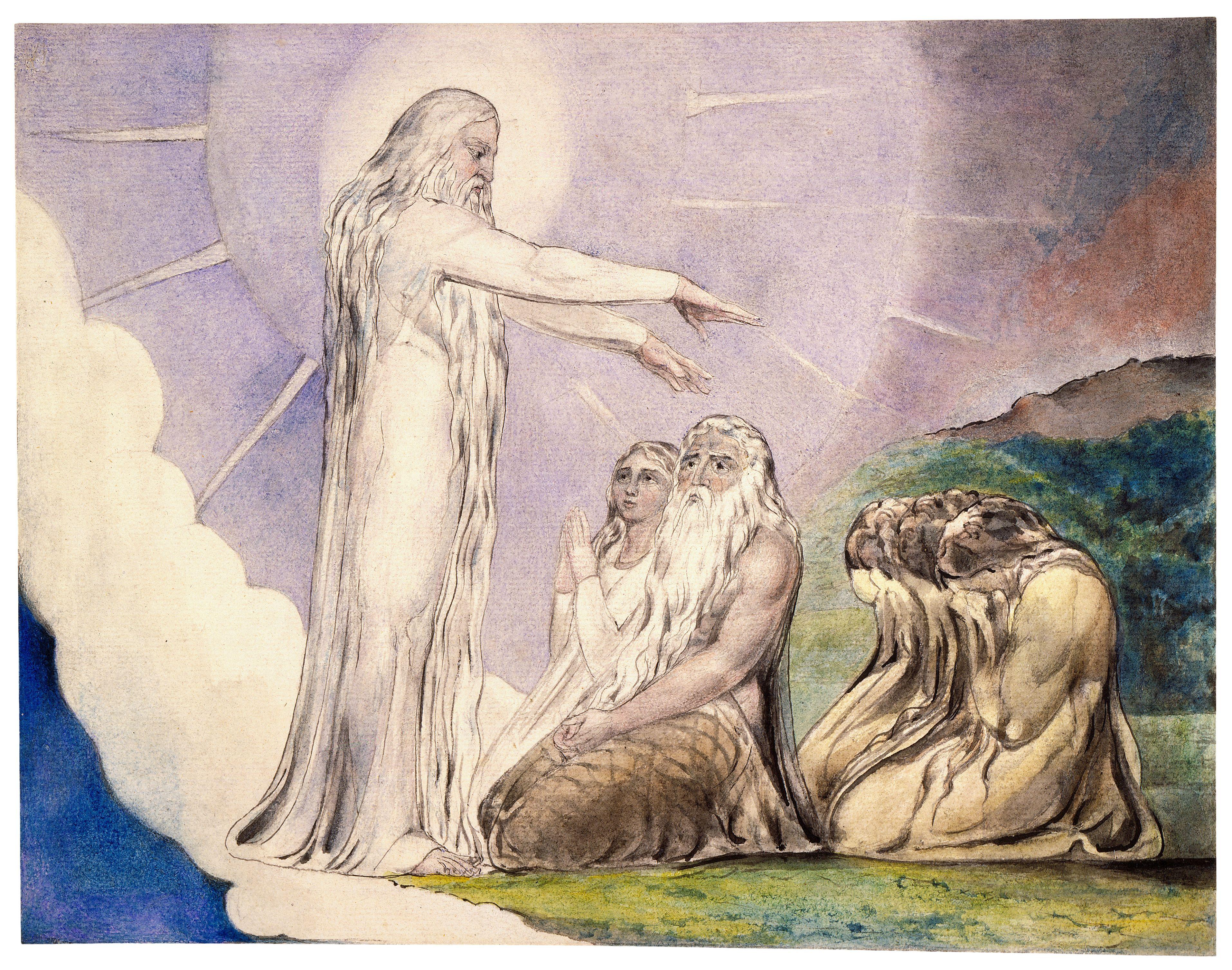The Vision of Christ

Songs and Ballads, Auguries of Innocence,(E 492)
"He who Doubts from what he sees
Will neer Believe do what you Please
If the Sun & Moon should Doubt
Theyd immediately Go out"
An Individual's loss of the ability to perceive the Divine Body may be called a loss of faith. Each individual psyche must rely upon a unifying principle to maintain a stable outlook. When this object of faith loses its ability to provide a cohesive scheme of organization the individual enters a state of doubt. Blake treats the experience of losing and regaining faith in his repeated accounts of fall and renewal. Milton in the following passage willingly separates himself from his unifying principle and views instead the 'shades of Death & Ulro'. He strips himself of the protective garments and enters the state of doubt through which a reorganization may take place.
Milton, PLATE 14 [15], (E 108)
"Then there was great murmuring in the Heavens of Albion
Concerning Generation & the Vegetative power & concerning
The Lamb the Saviour: Albion trembled to Italy Greece & Egypt
To Tartary & Hindostan & China & to Great America
Shaking the roots & fast foundations of the Earth in doubtfulness
The loud voic'd Bard terrify'd took refuge in Miltons bosom
Then Milton rose up from the heavens of Albion ardorous!
The whole Assembly wept prophetic, seeing in Miltons face
And in his lineaments divine the shades of Death & Ulro
He took off the robe of the promise, & ungirded himself from the
oath of God
And Milton said, I go to Eternal Death!"
In these few lines Blake puts in more prosaic terms the process which is being undertaken in Milton's psyche.
Milton, PLATE 40 [46],(E 141)
"The Negation is the Spectre; the Reasoning Power in Man
This is a false Body: an Incrustation over my Immortal
Spirit; a Selfhood, which must be put off & annihilated alway
To cleanse the Face of my Spirit by Self-examination."
Milton is called upon to undergo these stages in this process of rebuilding:
Milton ,PLATE 41 [48], (E 142)
"To cast off Rational Demonstration by Faith in the Saviour
To cast off the rotten rags of Memory by Inspiration
To cast off Bacon, Locke & Newton from Albions covering
To take off his filthy garments, & clothe him with Imagination
To cast aside from Poetry, all that is not Inspiration"
Blake also describes the process as one in which external forces attempt to take away the ability of a individual to perceive the Divine Body.
Milton ,PLATE 41 [48], (E 142)
"These are the destroyers of Jerusalem, these are the murderers
Of Jesus, who deny the Faith & mock at Eternal Life:
Who pretend to Poetry that they may destroy Imagination;
By imitation of Natures Images drawn from Remembrance
These are the Sexual Garments, the Abomination of Desolation
Hiding the Human lineaments as with an Ark & Curtain
Which Jesus rent: & now shall wholly purge away with Fire"
The reorganization which may be called a recovery of faith is spoken of near the end of Jerusalem. The darkness has been integrated into the whole man who is Jesus. The 'Body of Doubt' has been deprived of independent existence.
Jerusalem, Plate 93,(E 253)
"Then Los again took up his speech as Enitharmon ceast
Fear not my Sons this Waking Death. he is become One with me
Behold him here! We shall not Die! we shall be united in Jesus.
Will you suffer this Satan this Body of Doubt that Seems but Is
Not
To occupy the very threshold of Eternal Life."
The robust faith that Blake had in the verities which he knew from internal experience is expressed in these lines.
Annotations to Watson, (E 613)
"The Man who pretends to be a modest enquirer into the truth of a self evident thing is a Knave The truth & certainty of Virtue & Honesty i.e Inspiration needs no one to prove it it is Evident as the Sun & Moon He who stands doubting of what he intends whether it is Virtuous or Vicious knows not what Virtue means. no man can do a Vicious action & think it to be Virtuous. no man can take darkness for light. he may pretend to do so & may pretend to be a modest Enquirer. but is a Knave"
Blake has the same confidence that man may draw near to God as does the author of Hebrews.
Hebrews
10:19-25 - So by virtue of the blood of Jesus, you and I, my brothers, may now have courage to enter the holy of holies by way of the one who died and is yet alive, who has made for us a holy means of entry by himself passing through the curtain, that is, his own human nature. Further, since we have a great High Priest set over the household of God, let us draw near with true hearts and fullest confidence, knowing that our inmost souls have been purified by the sprinkling of his blood just as our bodies are cleansed by the washing of clean water. In this confidence let us hold on to the hope that we profess without the slightest hesitation - for he is utterly dependable - and let us think of one another and how we can encourage each other to love and do good deeds. And let us not hold aloof from our church meetings, as some do. Let us do all we can to help one another's faith, and this the more earnestly as we see the final day drawing ever nearer.
No comments:
Post a Comment